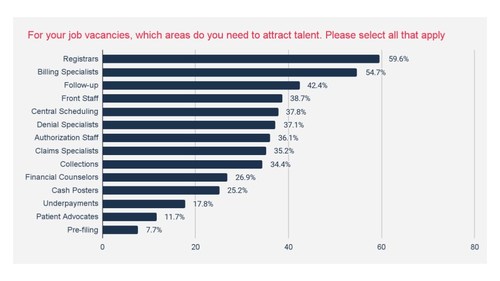Registrars, billing specialists, and patient-facing staff top the list
AKASA™, the leading developer of AI for healthcare operations, released findings from a new survey where healthcare finance leaders ranked the roles within the revenue cycle where they most need talent. The results highlight the stark reality leaders face when managing daily operations in the back office with a shortage of workers and fierce hiring competition.
Read More: SalesTechStar Interview With Bruno Guicardi, President Of CI&T

The survey of more than 400 healthcare financial leaders ranked the following as the roles where they have the greatest need to fill vacancies:
- Registrars
- Billing specialists
- Patient follow-up
- Front-office staff
- Central scheduling
- Denial specialists
- Authorization staff
- Claims specialists
- Collections
“We’re seeing staffing gaps at every stage of the revenue cycle process,” said Amy Raymond, vice president of revenue cycle operations at AKASA. “Revenue cycle departments are essential to the success of a healthcare organization. But this function of healthcare isn’t care-related and thus, often considered not revenue-generating. The result? Reactive, rather than proactive, hiring. When there’s a demand, revenue cycle specialists are hired. When there’s less demand, they’re let go. This reactionary hiring cycle results in permanent workers often facing too much work, and patients having a less-than-stellar financial experience.”
Because of the difficulty to recruit, this also squeezes leaders on effectively retaining top talent. It’s challenging to find the time and resources required to train and upskill revenue cycle specialists currently on staff. Even if you have experienced employees, they’re likely facing more work than they can handle and not working at the top of their skill set — making them underutilized and at risk of leaving. To help fill in the staffing gaps and elevate staff, hospitals and healthcare systems are increasingly looking to AI-powered automation solutions.
“When you weave in an effective automation tool, you’re adding a team member, or an entire team of members, that integrates with your staff and helps things run smoother,” said Raymond. “The technology essentially provides you with virtual full-time employees. Some of the work your team is doing now can be reassigned to the automation, freeing up the team to handle more value-generating tasks that require true human judgment.”
Read More: SalesTechStar Interview With Bruno Guicardi, President Of CI&T
AKASA is helping leaders understand the changing dynamics impacting the revenue cycle, offering strategies and insights from our experts and solutions to transform healthcare operations in this challenging environment. To learn more, download our report, “No Resignation: Solving Today’s Greatest Staffing Challenges in the Healthcare Revenue Cycle.
Commissioned by AKASA, the survey fielded responses from 411 chief financial officers and revenue cycle leaders at hospitals and health systems across the United States through the Healthcare Financial Management Association’s (HFMA) Pulse Survey program between December 1, 2021 and December 21, 2021. The national survey was designed to assess the adoption of automation in revenue cycle operations at hospitals and health systems across the U.S.





















